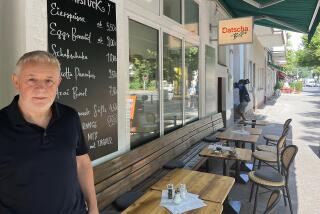Culture : One Germany, Two Languages, Much Confusion : East and West developed their own lexicons during 40 years of separation. Some variations are minor, but others reflect different ways of looking at the world.
- Share via
HALLE, Germany — “When the general atmosphere is bad, language must suffer,” George Orwell remarked in the politically befouled climate of 1946, at the dawn of the Cold War. He delivered himself of this pronouncement in his enduring essay “Politics and the English Language” three years prior to the founding of the German Democratic Republic and nearly two decades before bricklayers fell to work on the Berlin Wall, a.k.a. der antifaschistische Schutzwall , or anti-fascist protective wall.
But as is almost always true of Orwell, the man was dead right. The contrasting fortunes of written and spoken German in the two successor states to the Third Reich are more than proof enough.
No sooner did the Wall come down in 1989 than western and eastern Germans discovered thatthey had developed often ludicrously different ways of communicating during their 40 years of separation. Some differences were minor vocabulary quirks--each side had come up with its own word for “grocery bag,” for instance--but in many cases the linguistic variations were politically charged, the stuff of two wholly separate ways of looking at things.
Now that the process of German reunification is often proving to be an awkward business for all parties, with easterners resenting the west and vice versa, language is turning out to be one more factor underlining--and at times perpetuating--the national divide.
“People in the east want to learn western German,” says Ingrid Kuehn, a scholar of German language and literature at Martin Luther University in the eastern city of Halle. “But, of course, they don’t know all the words, so they mix things up. They will be talking with a westerner about their ‘work team,’ and all of a sudden they’ll forget and slip in the word ‘ Kollektiv .’ Then the western German will say, ‘What kind of weird language do these people speak?’ ”
For the past year, Kuehn has been running a hot line out of her department at the university, where easterners can call and, free of charge, learn how to get back onto an even linguistic footing with their western compatriots. Though she takes calls just three days a week, and advertises with simple handbills tacked up on bulletin boards, she averages 60 inquiries per week, from people seeking help with everything from letter-writing--how to close, if you don’t say “with socialist regards” any more?--to the pronunciation of the many English words--”leasing,” “cash,” “surfboard”--that have worked their way into western German over 45 years.
“People in eastern Germany have had to adopt a whole new system and, with the new system, a whole new vocabulary,” says Kuehn, herself a former citizen of East Germany, officially known as the German Democratic Republic. “Right now, they don’t feel comfortable in their own mother tongue. They don’t want to go into a shop and make fools of themselves.”
And unfortunately, to western ears, many eastern German words sound just that--foolish. During the Cold War, no one in West Germany made any particular effort to shape the language along ideological lines, but in East Germany the government tried deliberately to write a new socialist lexicon--and, with it, to nurture a new socialist identity.
Much of what the authorities dreamed up sounds straight out of Orwell’s “1984.” The angels that decorate the tops of Christmas trees, for instance, are called “Christmas angels” in western Germany. But in the east, where angels and Christmas were politically incorrect? Nothing doing. They were sold in boxes labeled “Year-End Winged Figure.”
A flag, likewise, was not a Fahne , or flag, in the GDR, but a Winkelement , or “waving element,” because the authorities used to hand them out before parades and expect people to wave them. Communist agricultural planners even decided to call the lowly cow a Grossvieheinheit , or “large cattle unit.”
“They wanted to show that a socialist cow was something special, different from a capitalist cow,” says Siegmar Pfeil, an associate professor of German language and literature at Jena University, who like Kuehn has been watching what happens to the language as the former East and West come together.
Pfeil notes that outside the Communist Party, few East Germans warmed to the Newspeak. They could watch Western television and see easily enough that, in the rest of the world, a Christmas angel was still called a Christmas angel.
“If they used these words, they did so with a twinkle in their eye,” says Pfeil. And as soon as there was no more Eastern regime to reinforce the new language, the worst barbarisms died quickly.
But just because easterners know that certain words are non-starters, Kuehn says, that doesn’t mean they always know which western words to use. She finds easterners at the greatest loss when it comes to job-seeking--a subject of intense interest, with the unofficial eastern German unemployment rate near 30%.
A job-seeker who lets his easternness show in a carelessly worded letter of application runs a risk, Kuehn says, because the west German stereotype is that easterners lack a work ethic.
“There is discrimination,” she says.
Her callers are often unsure how to describe themselves in terms suitably glowing and self-promoting for the tastes of a western personnel office. In the old East, after all, no one boasted about being “ambitious,” or a “self-starter.” Even the word “career” had negative connotations.
“I can see that some people are trying to avoid using certain words, like ‘career,’ because they have difficulties with the values connected with them,” says Kuehn.
“They are unable to use them in a neutral way.”
Once you have Resume-Speak pretty well down, where to send off your application? To the personnel director, of course, but the eastern term for “personnel” is Kader --a word that sounds, dangerously, as if it has something to do with Marxist cadres.
“Yes, that word now has a negative odor,” says Kuehn. She advises her callers to write to the Personalchef .
Kuehn says she got the idea of a language hot line in 1991, when she went to a linguists’ conference in the former West Germany and discovered that, on that side of the country, there were phone services in place to help secretaries, students and others with grammar and style problems.
“I thought I should start one in the east, because people here need it so much more,” she says.
In the four years since the east and the west united, Kuehn says, she has seen the linguistic gap start to narrow, but this is almost always because easterners are adopting western words.
But here and there, Kuehn and her colleagues are also spotting signs that easterners are resisting the western linguistic Anschluss , and reviving their own unique words.
The occasional shop window in the east now carries a sign saying “WtB,” an abbreviation for the eastern term for “general store”: a signal that made-in-the-east products are for sale inside. Many easterners now make special efforts to seek out locally produced goods, just for the sake of solidarity.
“Although it’s not an organized effort, there is definitely a kind of protest going on, on the part of some people,” says Kuehn. “I see it expressed mainly in letters to the newspapers. People will say things like, ‘I will never use this stupid western word cash. I will always say Bargeld .’ ”
More to Read
Sign up for Essential California
The most important California stories and recommendations in your inbox every morning.
You may occasionally receive promotional content from the Los Angeles Times.













